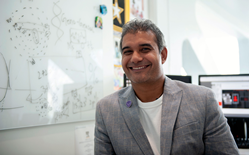
Dr. Ajeet Kaushik, assistant professor of chemistry at Florida Polytechnic University, has four research papers added to the World Health Organization’s database of global literature on COVID-19.
No one can propose a good single solution to handle this, so different people with different expertise have to do different jobs. I’m targeting the brain while other people are targeting lungs, the gut, the kidneys, and the behavioral health aspect.
LAKELAND, Fla. (PRWEB)
January 11, 2021
The World Health Organization (WHO) has selected leading-edge research on fighting COVID-19 by Dr. Ajeet Kaushik, assistant professor of chemistry at Florida Polytechnic University, to be featured in its database of global literature on coronavirus disease.
Kaushik has published several scientific papers in 2020 and 2021 that explore the use of nanomedicine, biosensors, and artificial intelligence to diagnose and combat COVID-19. He joined scientists around the world in shifting his attention toward addressing the current pandemic.
“If a country is facing a problem, as part of the University I have to do my best to solve this problem,” Kaushik said. “When the Ebola virus and the Zika virus came about, my advisor told me that we are working for humanity. We are working for society, so we have to do our best to solve a problem that is very important.”
Kaushik’s ongoing research explores advanced electrochemical sensing systems and nanomedicine for personalized health wellness. His most recent paper focuses on manipulative magnetic nanomedicine and the future of COVID-19 therapy, and was published in the journal Expert Opinion on Drug Delivery.
The research states that manipulative nanomedicine – delivering drugs to a highly specific part of the body – can provide a safer, more precise, and more effective way to treat patients grappling with multiple diseases and symptoms as a result of COVID-19.
“This infection is different – we are not dealing only with respiratory problems. We are dealing with heart failure, kidney problems, anxiety, depression, vision problems, and more, all because of coronavirus,” Kaushik said. “No one can propose a good single solution to handle this, so different people with different expertise have to do different jobs. I’m targeting the brain while other people are targeting lungs, the gut, the kidneys, and the behavioral health aspect.”
Kaushik also was among the authors of a paper published in ACS Applied Bio Materials titled “Electrochemical SARS-CoV-2 Sensing at Point-of-Care and Artificial Intelligence for Intelligent COVID-19 Management,” a paper in the Journal of Alzheimer’s Disease titled “COVID-19: Review of a 21st Century Pandemic from Etiology to Neuro-psychiatric Implications,” and a paper in Biosensors and Bioelectronics titled “Functionalized terahertz plasmonic metasensors: Femtomolar-level detection of SARS-CoV-2 spike proteins.” All three are featured in the WHO database as well.
He is hopeful his contributions to the COVID-19 fight will have a strong impact.
“Maybe these papers can help someone who is working in a company and can now think about developing smart sensors for point-of-care testing and sending a drug to the brain using nanotechnology,” Kaushik said. “No one can handle this problem on their own, so we need a group of people working together to handle one single problem connected to the coronavirus.”
Kaushik’s efforts related to exploring nano-biotechnology for health wellness earned him the Early Career Award 2020 from the International Journal of Nanomedicine.
Share article on social media or email:

